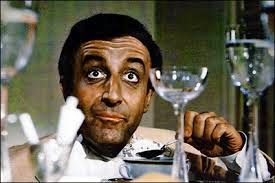 |
| Ursula causes high blood pressure |
Spike Milligan said Peter Sellers was not a actor, but a
freak — and meant it as high praise. Sellers’ aptitude for mimicry was so
far beyond the norm, there had to be something else going on. Possibly he was sad heir to a Frankensteinian alchemy endowing the chosen to speak with genuine voices — yet unable to fake souls.
A freak? An article about Sellers in a 1960's edition of Vogue
suggests that it’s genius when we accept the veracity of the fake over the fiction of the original. Director Stanley Kubrick was astonished at Sellers' seemingly limitless talent - and astonishment was rarely a Kubrickian reaction.
 |
| A Frankensteinian alchemy |
That Sellers was mentally ill - yet functional - is tribute
to his will power and the more morbid aspects of the entertainment industry.
There was about him sadness, a technical detachment that veered away from ensemble performances and aligned him with gadgetry — anything that wasn't alive. His best work is seen in films with thin plot lines — because Sellers never belonged to anything, let alone himself. He was no good at life.
 |
| Not Being Anywhere |
Every girlfriend, every wife, every movie, seemed to further
eviscerate his damaged heart. And when the end arrived, a slumming deity gazed from a cloud and pronounced, “Let him speak to us all in the voice of God — because God is hard to imitate. Plus, He never makes us laugh."





